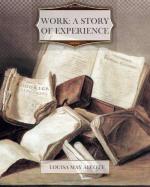“It is only for a time, else I couldn’t let thee go, my dear,” said Mrs. Sterling, with a close embrace.
“I shall see you at church, and Tuesday evenings, even if you don’t find time to come to us, so I shall not say good-by at all;” and David shook hands warmly, as he put her into the carriage.
“I’ll invite you to my wedding when I make up my mind,” said Kitty, with feminine malice; for in her eyes Christie was an old maid who doubtless envied her her “lots of lovers.”
“I hope you will be very happy. In the mean time try to save dear Mrs. Sterling all you can, and let her make you worthy a good husband,” was Christie’s answer to a speech she was too noble to resent by a sharp word, or even a contemptuous look.
Then she drove away, smiling and waving her hand to the old lady at her window; but the last thing she saw as she left the well-beloved lane, was David going slowly up the path, with Kitty close beside him, talking busily. If she had heard the short dialogue between them, the sight would have been less bitter, for Kitty said:
“She’s dreadful good; but I’m glad she’s gone: ain’t you?”
“No.”
“Had you rather have her here than me?”
“Yes.”
“Then why don’t you ask her to come back.”
“I would if I could!”
“I never did see any thing like it; every one is so queer and cross to-day I get snubbed all round. If folks ain’t good to me, I’ll go and marry Miles! I declare I will.”
“You’d better,” and with that David left her frowning and pouting in the porch, and went to shovelling snow with unusual vigor.
CHAPTER XIV.
Which?
DAVID.
Mr. Power received Christie so hospitably that she felt at home at once, and took up her new duties with the energy of one anxious to repay a favor. Her friend knew well the saving power of work, and gave her plenty of it; but it was a sort that at once interested and absorbed her, so that she had little time for dangerous thoughts or vain regrets. As he once said, Mr. Power made her own troubles seem light by showing her others so terribly real and great that she was ashamed to repine at her own lot.
Her gift of sympathy served her well, past experience gave her a quick eye to read the truth in others, and the earnest desire to help and comfort made her an excellent almoner for the rich, a welcome friend to the poor. She was in just the right mood to give herself gladly to any sort of sacrifice, and labored with a quiet energy, painful to witness had any one known the hidden suffering that would not let her rest.




